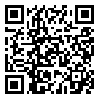BibTeX | RIS | EndNote | Medlars | ProCite | Reference Manager | RefWorks
Send citation to:
URL: http://jdisabilstud.org/article-1-3437-en.html
2- Assistant Professor, Buin-Zahra Branch, Islamic Azad University, Buin Zahra, Iran
Abstract
Background & Objectives: When education is combined with entertainment, it has significant effects on academic and psychological components. Today, technology in various areas of human life has allowed educational situations to benefit from this opportunity. Some scholars believe that learning should always be colorful and entertaining and that information can be acquired without serious work and study. Thus, it is essential to know that education is about developing cognitive structures. Educational technology is a medium, not a mere education, useful in creating such a learning environment. Therefore, numerous educational methods based on new technologies have been introduced to the world of learning. Learning through play is a natural way to acquire knowledge and skills. So, the present study aimed to investigate the effectiveness of edutainment on academic achievement motivation and test anxiety of third–grade male students.
Methods: This study's research method was quasi–experimental with a pretest–posttest control group design. The study's statistical population is all elementary school classes of Noavaran Andisheh Boys' School in District 3 of Tehran City, Iran, in the academic year 2020–2021. They were 49 people. The sample size of this study was 30 eligible third–grade elementary school volunteer students recruited through purposive sampling from two classes of this school. They were randomly assigned to two experimental and control groups (15 in the experimental group and another 15 in the control group). The inclusion criteria were as follows: students should not have a teacher at home or be taught with their parents' help and should not be taught by methods other than those specified in this study. The exclusion criterion was excessive absences from classes, ie, not attending more than half of the class sessions. However, excessive absences did not occur in this study. In the pretest and posttest stages, the samples responded to the Hermans Revised Achievement Motivation Questionnaire (Hooman & Asgari, 2001) and the Test Anxiety Questionnaire (Abolghasemi et al., 1996). The experimental variable in this study, the game "Kahoot" (Oslo, 2012), was presented to the experimental group subjects for 20 sessions. Among the factors affecting the study's internal validity were the absence of students or lack of cooperation on the days of the experiment or the time of the tests. The time of the intervention program was coordinated with the school staff, and the students were asked to answer the questionnaires at the appointed time. In this study, descriptive statistics indicators, including minimum, maximum, mean, and standard deviation, were used to describe the data, and multivariate analysis of covariance was used to analyze the data. All data were analyzed at a significance level of 0.05 using SPSS software.
Results: The results showed that after removing the pretest effect, there was a significant difference between the experimental and control groups in academic achievement motivation and test anxiety in the posttest due to the application of the edutainment method intervention (p<0.001). Based on the eta squared values, it was determined that 85.1% and 93.6% of the increase in academic achievement motivation and the decrease in test anxiety in the posttest were due to the application of the fun learning method, respectively.
Conclusion: According to the findings, educational methods based on entertainment effectively increase motivation and reduce test anxiety in students.
| Rights and permissions | |
 |
This work is licensed under a Creative Commons Attribution-NonCommercial 4.0 International License. |



